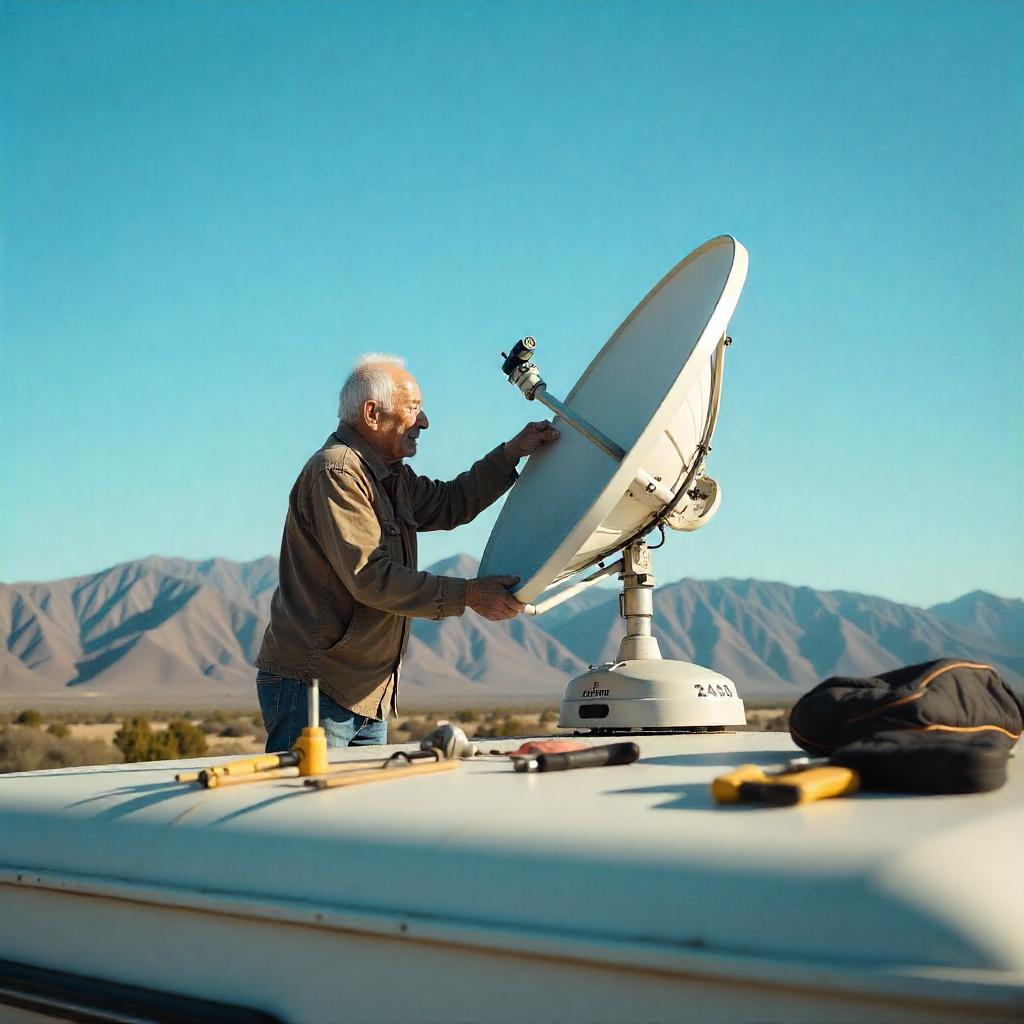How to Get Internet in an RV?

Owning a RV is one way to travel and while on the road you need to have access to the internet as much as in your home. Whether surfing in the office, watching television, or browsing social media, having good Internet connection can greatly improve your travel plan. This article will review How to Get Internet in an RV?, the criteria for selecting the Internet plan, basic recommendations to achieve the most efficient broadband connection.
Table of Contents
Key Takeaways
- Assess Your Needs: Understand your internet usage before choosing a plan.
- Explore Options: From cellular data to satellite internet, know the pros and cons of each method.
- Stay Secure: Use VPNs and secure your router to protect your data.
- Budget Wisely: Keep an eye on costs and look for savings opportunities.
1. Key Factors to Consider When Choosing RV Internet
Before diving into the various internet options, it’s essential to assess your specific needs. Here are a couple of key factors to consider:
Internet Usage Needs
Understanding how you plan to use the internet will help you choose the right option.
Casual Browsing vs. Heavy Streaming
- Casual Browsing: If the only tasks you perform on the internet are to send and receive e-mails or surf social networks, or read articles, then, perhaps, a usual pack of data is enough for you.
- Heavy Streaming: For streaming movies, using video calls or playing online games, streaming, you will need a plan with more data allowance as well as higher speed.
Working Remotely from Your RV
- Recommended that your internet connection should be sufficient for any working purposes.
- Find out what your employer has to say about bandwidth for use of video conferencing or even for transferring large files.
Coverage and Accessibility
Consider where you’ll be traveling and how that affects your internet options.
Urban vs. Rural Connectivity Challenges
- Urban Areas: While they generally are more likely to have better cellular and Wi-Fi availability, they can locate more secure connections.
- Rural Areas: It may not have adequate access to high speeds internet; therefore, resort to other means like the satellite internet.
Seasonal Considerations for Travel and Coverage
- Some areas may have better internet connectivity during specific seasons. Plan your trips accordingly, especially if you rely on public Wi-Fi.
2. Popular Methods for Getting Internet in an RV
There are several methods to connect to the internet in your RV, each with its pros and cons. Here are the most popular options:
Cellular Data Plans
Cellular data plans allow you to connect to the internet through your smartphone or a dedicated mobile hotspot.
Unlimited Data Plans for RVs
- Pros: Great for streaming and heavy usage.
- Cons: May come with higher costs and potential throttling after reaching a certain data usage limit.
Data Caps and Throttling Issues
Most cellular providers have data caps, which can limit your internet speed after reaching a specific threshold. Always check the terms of your plan before committing.
Public Wi-Fi Networks
Public Wi-Fi is commonly available at campgrounds, coffee shops, and other locations.
Using Campground Wi-Fi
- Pros: Often free or low-cost.
- Cons: May be slow or unreliable, especially during peak hours.
Security Concerns and Reliability
Public Wi-Fi can expose your data to security risks. Always use a VPN to secure your connection and avoid sensitive transactions.
3. Mobile Hotspot Devices
Mobile hotspots are portable devices that provide internet access using cellular data.
What is a Mobile Hotspot and How It Works
A mobile hotspot connects to a cellular network and allows multiple devices to access the internet simultaneously.
Portable and Versatile Internet Option
- Can be easily transported and used in various locations.
- Often supports multiple devices (phones, tablets, laptops).
Compatibility with Multiple Devices
- Check if the hotspot device can connect to the devices you plan to use. Most modern hotspots support Wi-Fi-enabled devices.
Best Mobile Hotspots for RV Use
When choosing a mobile hotspot, consider factors like speed, battery life, and data plans. Here’s a comparison table of popular options:
| Device Name | Network Compatibility | Maximum Connections | Data Plan Options | Price Range |
| Verizon Jetpack | Verizon | Up to 10 | Unlimited, shared data | $99-$299 |
| AT&T Nighthawk | AT&T | Up to 20 | Unlimited, pay-as-you-go | $99-$249 |
| T-Mobile Inseego | T-Mobile | Up to 10 | Unlimited, family plans | $89-$199 |
4. Wi-Fi Extenders and Boosters
Wi-Fi extenders can help improve connectivity by amplifying weak signals.
Why You Might Need a Wi-Fi Extender
Using a Wi-Fi extender can enhance your internet experience, especially in areas with weak signals.
Extending Campground or Public Wi-Fi Signal
- Wi-Fi extenders can pick up weak signals from nearby networks and boost them to provide a better connection in your RV.
Improving Weak Signals in Remote Areas
- In remote areas, an extender can help maintain a stable connection when the signal is low.
Recommended Wi-Fi Boosters for RVs
Here are some top-rated Wi-Fi boosters suitable for RV use:
| Product Name | Compatibility | Coverage Area | Price Range | Features |
| Wi-Fi Ranger Elite | All Wi-Fi devices | Up to 1 mile | $199-$299 | Dual-band, weatherproof |
| NETGEAR Wi-Fi Range Extender | All Wi-Fi devices | Up to 2,500 sq ft | $70-$130 | Easy setup, compact design |
| Alfa Wi-Fi Camp Pro 2 | All Wi-Fi devices | Varies | $79-$200 | High-gain antennas, portable |
5. Satellite Internet for RVs
For those who travel to remote areas, satellite internet may be the best option.
How Satellite Internet Works
Satellite internet connects you to the internet via satellites orbiting the Earth, providing coverage in remote locations.
Suitable for Remote and Off-Grid Locations
- Ideal for campers who travel off the beaten path where traditional internet services are unavailable.
Limitations: Speed, Data Caps, and Cost
- Typically slower than cable or fiber internet.
- Often has data caps and can be more expensive.
Satellite Providers and Plans
Here’s a comparison of popular satellite internet providers for RV users:
| Provider | Average Speed | Data Caps | Price Range | Installation Fees |
| Starlink | Up to 100 Mbps | No caps | $110-$130/mo | Free self-installation |
| HughesNet | Up to 25 Mbps | 10-50 GB | $50-$150/mo | $99 one-time fee |
| Viasat | Up to 100 Mbps | 12-150 GB | $50-$150/mo | $299 one-time fee |
6. Choosing the Best Cellular Carrier for RV Internet
Selecting the right cellular carrier can make a significant difference in your internet experience.
Comparing Major Carriers (Verizon, AT&T, T-Mobile)
Each carrier has its strengths and weaknesses, especially regarding coverage and plan options.
Coverage Maps and RV-Friendly Plans
- Review coverage maps to see which carrier provides the best service in the areas you plan to visit.
Data Speeds and Throttling Policies
- Look for plans with minimal throttling after data limits are reached.
Read Also : Can You Physically Push in an RV Slide Out?
Considerations for International Travel
If you plan to travel outside the U.S., consider these tips:
Data Roaming and International Plans
- Check if your carrier offers affordable international plans or data roaming options.
Using Local SIM Cards vs. International Plans
- In some cases, it might be cheaper to purchase a local SIM card in the country you’re visiting.

7. Tips for Reliable and Consistent RV Internet
To maximize your internet experience, consider these practical tips:
Use Multiple Internet Options
Having backup options can save you when one fails.
Combining Cellular with Public Wi-Fi
- Use cellular data for critical tasks while relying on public Wi-Fi for casual browsing.
Why Backup Options are Essential
- Weather, location, and network congestion can affect connectivity. Backup options ensure you stay online.
Network Optimization Tips
Optimizing your internet connection can improve speed and reliability.
Reduce Data Consumption to Extend Usage
- Limit streaming and downloading during peak usage times to conserve data.
Apps and Tools to Monitor Internet Speed and Usage
- Use apps like Speedtest or Data Usage Monitor to keep track of your internet performance and usage.
8. Securing Your RV Internet Connection
Security should be a top priority when accessing the internet in your RV.
Protecting Your Data on Public Networks
Public networks can be vulnerable to attacks, so ensure your data is secure.
Using a VPN for Enhanced Privacy
- A VPN encrypts your data, making it harder for hackers to intercept it. This is especially important when using public Wi-Fi.
Avoiding Sensitive Transactions on Public Wi-Fi
- Try to avoid logging into bank accounts or making purchases when connected to unsecured networks.
Firewalls and Router Security
Keeping your router secure is crucial for maintaining internet safety.
Setting Up a Secure Password
- Use strong, unique passwords for your Wi-Fi network to prevent unauthorized access.
Avoiding Unsecure Networks
- When available, opt for networks that require a password rather than open public networks.
9. Budgeting for RV Internet: Costs and Savings
Understanding the costs involved in RV internet can help you stay within budget.
Calculating Your Monthly Internet Costs
Consider all factors when calculating your expected monthly costs.
Affordable vs. Premium Plans
- Weigh the benefits of premium plans against your usage needs to find the best value.
Hidden Costs to Watch For
Be aware of any additional fees that could increase your expenses.
Overages, Installation Fees, and Equipment Rentals
- Always read the fine print to understand what’s included in your plan and what may incur extra charges.
10. Budget-Friendly Tips for RV Internet
Here are some strategies to help you save on internet costs:
Using Free Wi-Fi Options
Leverage free Wi-Fi when available to reduce your data usage.
Best Places to Find Free Wi-Fi
- Look for coffee shops, libraries, and fast-food restaurants, which often offer free internet access.
Combining Plans for Cost Efficiency
Consider bundling your mobile hotspot and cellular data plans.
Bundling Plans for Savings
- Many carriers offer discounts when you bundle multiple services. Investigate these options to save money.
Conclusion
It is easier to get an internet connection in an RV than before because of the many techniques available in the market. If you read carefully, it will help you determine your individual needs and the possibility of selecting the right way to communicate if you decide to leave for the great unknown. When deciding on which networking to go for, it is always important that you take into account issues such as coverage security and cost. The best approach is then to plan how to keep bouncing from one RV connection to the other to ensure the internet flows smoothly on your trips.
With this guide, you’ll be well-equipped to find the best internet solution for your RV adventures. Happy travels and happy browsing!



